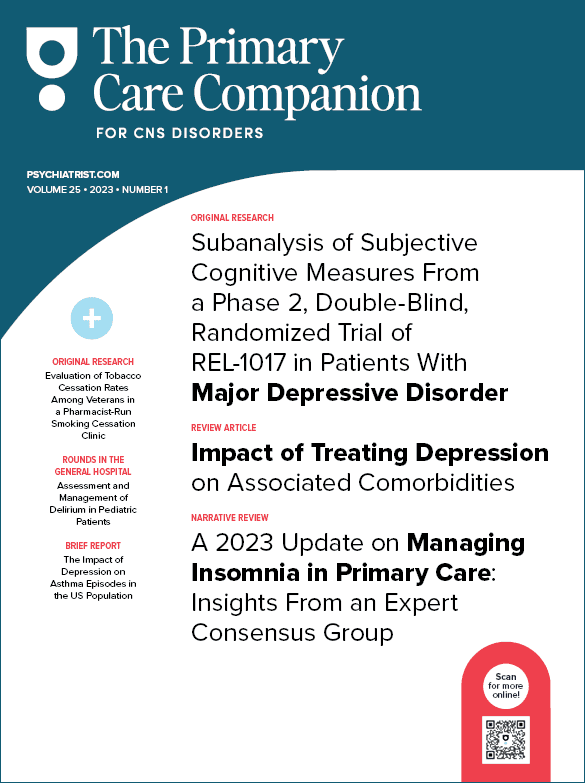With the recent increase in use of atypical antipsychotics, the possible side effect profile of this group of drugs is expanding in clinical practice. In addition to galactorrhea, sexual dysfunction, metabolic syndrome, and extrapyramidal side effects, cardiac side effects are also seen with atypical antipsychotics. Cardiac side effects include orthostatic hypotension, ventricular tachycardia, corrected QT (QTc) prolongation, myocarditis, pericarditis, syncope, and sudden death.1
Amisulpride is an atypical antipsychotic with selective affinity for D2/D3 receptors. The most common side effects of amisulpride include sleep disturbance, anxiety, agitation (5%–10%), drowsiness, constipation, and nausea. Vomiting and dry mouth (2%) as well as bradycardia could also occur, but these side effects are rather rare. High doses of amisulpride have been shown to cause QTc prolongation and torsades des pointes (TdP).2,3 However, a study4 of the electrocardiographic (ECG) data of 341 patients revealed no QTc prolongation with amisulpride. When the cardiac effects of amisulpride, olanzapine, clozapine, and sertindole were compared, amisulpride was found to be the safest at a resting heart rate.5 In an observational study6 examining the metabolic, endocrinologic, and cardiac side effects of amisulpride, the medication was found to be safe with the exception of high prolactin levels. Although amisulpride is considered safe regarding cardiac side effects, they may occur at high doses, as in our case. In this report, we present the case of a patient who developed supraventricular tachycardia after high-dose intoxication with amisulpride, which is considered safe as a side effect in most studies.
Case Report
A 42-year-old woman was brought to the cardiology emergency department by emergency services with complaints of tachycardia and syncope. The initial examination revealed palpitations and partial consciousness. Her vital signs were arterial blood pressure: 100/60 mm Hg, pulse: 180 bpm, body temperature: 37°C (98.6°F), and respiratory rate: 18 breaths/minute. During the cardiac examination, her heart rate was rhythmic and tachycardic. Her ECG showed supraventricular tachycardia. The QTc was calculated as 440 ms. The neuropsychiatric examination revealed that her consciousness was partially confused and disoriented. Disorganized speech and behavior and paranoid thought content were observed, and associations tended to disintegrate. According to her relatives, the patient had been taking amisulpride 800 mg/d for 2 years with the diagnosis of atypical psychosis but had used it irregularly in the past, sometimes taking 10 tablets on the same day. Once stable, the patient confirmed that she took 10 of the 200-mg tablets on the same day.
Gastric lavage was performed. Emergency brain tomography showed no pathology in the report. No abnormality was detected in the patient’s complete blood count, C-reactive protein, thyroid function, or biochemistry tests. The arterial blood gas results were pH: 7.38, bicarbonate: 22.1 mEq/L, partial pressure of carbon dioxide: 38.0 mm Hg, and partial pressure of oxygen: 95 mm Hg. The patient received a 6-mg injection of adenosine, and 12 mg was repeated according to the control ECG. The patient’s heart rate decreased to 98 bpm. After 24 hours of follow-up, the patient was conscious, oriented, and cooperative, and her vital signs (arterial blood pressure: 110/70 mm Hg, pulse: 85 bpm, body temperature: 37°C (98.6°F), respiratory rate: 14 breaths/minute) were stable, and she was transferred to the psychiatry service for elective treatment.
Discussion
The cardiovascular side effects of antipsychotic drugs are well known. Sudden death and ventricular arrhythmias associated with prolongation of the QT interval are the most worrisome.7 However, supraventricular arrhythmias are more common than ventricular arrhythmias. Most supraventricular arrhythmias are episodes of sinus tachycardia, but the most worrisome with antipsychotic drug use is atrial fibrillation of the supraventricular arrhythmia.8 Patients using antipsychotics had a 17% higher risk of atrial fibrillation compared to nonusers, which was associated with hypertension, diabetes, and ischemic heart disease.9 In a study10 of patients taking typical or atypical antipsychotics, the effects on heart rate, including severe tachycardia, were suggested to be dose related with little difference between groups. On the contrary, the risk of ventricular arrhythmia and sudden cardiac death may be higher among those who take typical antipsychotics compared to second-generation antipsychotics.7
Antipsychotic drugs with a high risk of ventricular arrhythmia and sudden cardiac death include haloperidol, prochlorperazine, sulpiride, thioridazine, quetiapine, and risperidone. Clozapine and olanzapine have been associated with an increased risk of ventricular arrhythmias and sudden cardiac death.7 In a retrospective study2 of amisulpride intoxication cases, which is an atypical antipsychotic that is considered safe in terms of cardiac side effects, a high rate of pathologic QTc prolongation and a TdP event rate of 7% were observed.
Prolongation of the QTc interval is a vector marker for a drug to cause TdP. An increase in absolute QTc interval > 500 msec or 60 msec from baseline in individual patients is considered indicative of an increased risk of TdP. The degree of QTc prolongation is dose dependent and varies between antipsychotics, reflecting their different capacities to block cardiac ion channels.11 In addition, the effect of antipsychotic use on ventricular arrhythmia and sudden cardiac death was thought to be dose dependent.12 Supraventricular tachycardia occurred in a patient who was titrated with clozapine, and, as in our case, a treatment response to adenosine was obtained.13 In our case, supraventricular tachycardia arose with a dose of amisulpride as high as 2,000 mg and responded to adenosine.
In conclusion, atypical and typical antipsychotics have the potential to contribute to severe tachycardia. However, as in our case, when an atypical antipsychotic such as amisulpride is taken in high doses, it may cause heart rate changes such as supraventricular tachycardia. It should be considered that antipsychotics may cause supraventricular tachycardia when taken in sudden high doses, and tachycardia that may occur with chronic use may lead to cardiac diseases such as cardiomyopathy.
Article Information
Published Online: September 21, 2023. https://doi.org/10.4088/PCC.23cr03504
© 2023 Physicians Postgraduate Press, Inc.
Prim Care Companion CNS Disord 2023;25(5):23cr03504
Submitted: February 4, 2023; accepted April 21, 2023.
To Cite: İzci F, İzci S. Supraventricular tachycardia caused by amisulpride intoxication. Prim Care Companion CNS Disord. 2023;25(5):23cr03504.
Author Affiliations: Erenköy Mental Health and Diseases Training and Research Hospital, Erenköy, Istanbul, Turkey (F İzci); Department of Cardiology, Kosuyolu High Specialization Training and Research Hospital, Istanbul, Turkey (S İzci).
Corresponding Author: Filiz İzci, MD, 19 Mayıs Mah, Bayar Cad, Erenköy Mental Health and Diseases Training and Research Hospital, Erenköy, Istanbul, Turkey ([email protected]).
Relevant Financial Relationships: None.
Funding/Support: None.
Patient Consent: Written informed consent was obtained from the patient to publish the case report, and information has been de-identified to protect anonymity.
ORCID: Filiz İzci: https://orcid.org/000-003-0576-9487; Servet İzci: https://orcid.org/0000-0002-4021-3444
References (13)

- Yağcıoğlu AE, Ertuğrul A. Antipsikotik İlaçların Kardiyovasküler Yan Etkileri. Psikiyatride Güncel. 2011;1:251–265.
- Isbister GK, Balit CR, Macleod D, et al. Amisulpride overdose is frequently associated with QT prolongation and torsades de pointes. J Clin Psychopharmacol. 2010;30(4):391–395. PubMed CrossRef
- Berling I, Isbister GK. Prolonged QT risk assessment in antipsychotic overdose using the QT nomogram. Ann Emerg Med. 2015;66(2):154–164. PubMed CrossRef
- Rein W, Coulouvrat C, Dondey-Nouvel L. Safety profile of amisulpride in short- and long-term use. Acta Psychiatr Scand suppl. 2000;101(suppl 400):23–27. PubMed CrossRef
- Agelink MW, Majewski T, Wurthmann C, et al. Effects of newer atypical antipsychotics on autonomic neurocardiac function: a comparison between amisulpride, olanzapine, sertindole, and clozapine. J Clin Psychopharmacol. 2001;21(1):8–13. PubMed CrossRef
- Kotan Z, Ertepe B, Akkaya C, et al. Metabolic, endocrinologic and cardiac effects of amisulpride: a 24-week follow-up study. Ther Adv Psychopharmacol. 2011;1(6):189–196. PubMed CrossRef
- Wu CS, Tsai YT, Tsai HJ. Antipsychotic drugs and the risk of ventricular arrhythmia and/or sudden cardiac death: a nation-wide case-crossover study. J Am Heart Assoc. 2015;4(2):e001568. PubMed CrossRef
- Lim AKH, Azraai M, Pham JH, et al. Severe tachycardia associated with psychotropic medications in psychiatric inpatients: a study of hospital medical emergency team activation. J Clin Med. 2021;10(7):1534. PubMed CrossRef
- Chou RH, Lo LW, Liou YJ, et al. Antipsychotic treatment is associated with risk of atrial fibrillation: a nationwide nested case-control study. Int J Cardiol. 2017;227:134–140. PubMed CrossRef
- Tajiri M, Suzuki Y, Sugai T, et al. Effects of olanzapine on resting heart rate in Japanese patients with schizophrenia. PLoS One. 2018;13(7):e0199922. PubMed CrossRef
- Haddad PM, Anderson IM. Antipsychotic-related QTc prolongation, torsade de pointes and sudden death. Drugs. 2002;62(11):1649–1671. PubMed CrossRef
- Ray WA, Chung CP, Murray KT, et al. Atypical antipsychotic drugs and the risk of sudden cardiac death. N Engl J Med. 2009;360(3):225–235. PubMed CrossRef
- Kim SJ, Gim MS. Clozapine-related paroxysmal supraventricular tachycardia: a case report. East Asian Arch Psychiatry. 2018;28(2):68–70. PubMed
Enjoy free PDF downloads as part of your membership!
Save
Cite
Advertisement
GAM ID: sidebar-top




